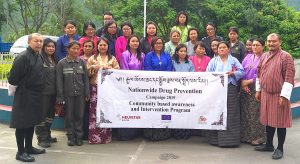Sonam Wangdi, popularly known as DhukDhuk from Haa hails from a broken family. Eldest among the three siblings of a single mother, he knew what kind of hardships his mother had to undergo throughout his life. It was this sense of struggle which made him work hard and led him to Sherubtse College. However, it was also his days at the college when his expenses and necessities grew but without any proportion to his sources. He had little or no right to ask for money from his mother who was already struggling to look after his two younger siblings back in the village. “On my first trip towards the east college bound, I had to sleep in the bus in the night’s halt at Bumthang because I didn’t have money to pay the hotel charges,” he recalls. Depression slowly crept in. By the time he realized, he had already taken solace in alcohol. He drank obnoxiously, to whimper away the troubles that became a part and parcel of his life since the day his father left them. In the comfort of the drinks, he regularly missed his classes, fell short on his attendance when exams knocked on the doors. The replenishment he had had left a gaping hole in his life, as he had to forgo college life. It was not that his name had been chucked off from the college registers. He could go back and resume his classes but he had to self-cater, which was a mounting challenge for someone like him from a destitute family background. “It was a huge mistake on my part not having confronted that problem with positivity and resorting to temporary solutions which has put a huge dent on my life,” he says regretfully. Seeking shelter with a relative back in Thimphu, he got employed in a private firm and remained sober for a while. He got into relationships and when things didn’t work out, he befriended the bottle again. Having witnessed the mess he was in, seniors in his workplace admitted him at a rehabilitation center. There was hope after a year but things again took a sour turn when he fell victim to another broken relationship. It was a point of no return, as he recalls. “Deep within and in the back of my head, I told myself that I will not live long if I stay in Thimphu,” he says. He started losing appetite and became paler by the day. After tendering resigna¬tion, he headed back to his village but the devil inside accompanied him wherever he went. Social stigmatization haunted him there. Jobless and penny less, grimaces and scornful words greeted him wherever he went. At that point in life, reality dawned upon him as he encountered the last stages of addic¬tion right before his eyes, on his own self. And before it became too little too late, he embraced rehabilitation and since then remained sober for almost seven years now. “As far as I am concerned, stigmatization will never work,” Sonam says. “Slow, patient, positive and collec¬tive nourishment from family, friends and the society at large plays the most important role in rehabilitation programmes.” Deriving from his personal accounts, Sonam urges everyone in the line to seek expert help and face the challenges before it’s too late. “There is wonder in what great things human will-power can achieve,” he says.
FIND US ON FACEBOOK
ADDRESS
- 02 333111
- 17398865 / 17398898
- [email protected]
- 1490
- Yangchen Lam, Thimphu.
- www.cpabhutan.org
© 2024 Chithuen Phendhey Association. All Rights Reserved.
Website Designed and Developed by Druk Digital Services.






